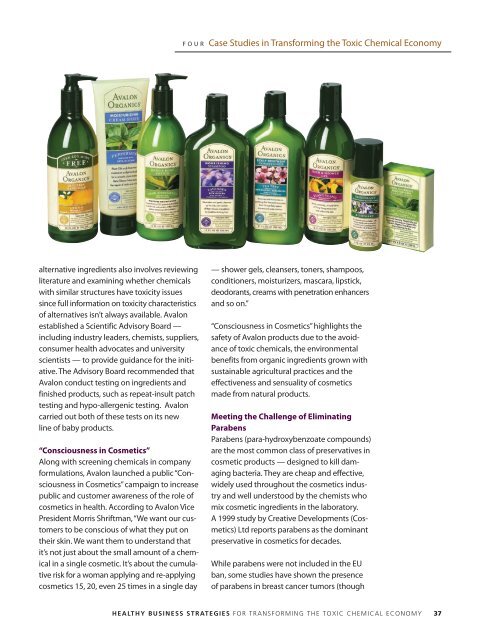Healthy Business Strategies - Clean Production Action
Healthy Business Strategies - Clean Production Action
Healthy Business Strategies - Clean Production Action
Create successful ePaper yourself
Turn your PDF publications into a flip-book with our unique Google optimized e-Paper software.
alternative ingredients also involves reviewing<br />
literature and examining whether chemicals<br />
with similar structures have toxicity issues<br />
since full information on toxicity characteristics<br />
of alternatives isn’t always available. Avalon<br />
established a Scientific Advisory Board —<br />
including industry leaders, chemists, suppliers,<br />
consumer health advocates and university<br />
scientists — to provide guidance for the initiative.<br />
The Advisory Board recommended that<br />
Avalon conduct testing on ingredients and<br />
finished products, such as repeat-insult patch<br />
testing and hypo-allergenic testing. Avalon<br />
carried out both of these tests on its new<br />
line of baby products.<br />
“consciousness in cosmetics”<br />
Along with screening chemicals in company<br />
formulations, Avalon launched a public “Consciousness<br />
in Cosmetics” campaign to increase<br />
public and customer awareness of the role of<br />
cosmetics in health. According to Avalon vice<br />
President Morris Shriftman, “We want our customers<br />
to be conscious of what they put on<br />
their skin. We want them to understand that<br />
it’s not just about the small amount of a chemical<br />
in a single cosmetic. It’s about the cumulative<br />
risk for a woman applying and re-applying<br />
cosmetics 15, 20, even 25 times in a single day<br />
F O u R Case Studies in Transforming the Toxic Chemical Economy<br />
— shower gels, cleansers, toners, shampoos,<br />
conditioners, moisturizers, mascara, lipstick,<br />
deodorants, creams with penetration enhancers<br />
and so on.”<br />
“Consciousness in Cosmetics” highlights the<br />
safety of Avalon products due to the avoidance<br />
of toxic chemicals, the environmental<br />
benefits from organic ingredients grown with<br />
sustainable agricultural practices and the<br />
effectiveness and sensuality of cosmetics<br />
made from natural products.<br />
Meeting the challenge of eliminating<br />
Parabens<br />
Parabens (para-hydroxybenzoate compounds)<br />
are the most common class of preservatives in<br />
cosmetic products — designed to kill damaging<br />
bacteria. They are cheap and effective,<br />
widely used throughout the cosmetics industry<br />
and well understood by the chemists who<br />
mix cosmetic ingredients in the laboratory.<br />
A 1999 study by Creative Developments (Cosmetics)<br />
Ltd reports parabens as the dominant<br />
preservative in cosmetics for decades.<br />
While parabens were not included in the Eu<br />
ban, some studies have shown the presence<br />
of parabens in breast cancer tumors (though<br />
healthy business strategies for transforming the toxic chemical economy


